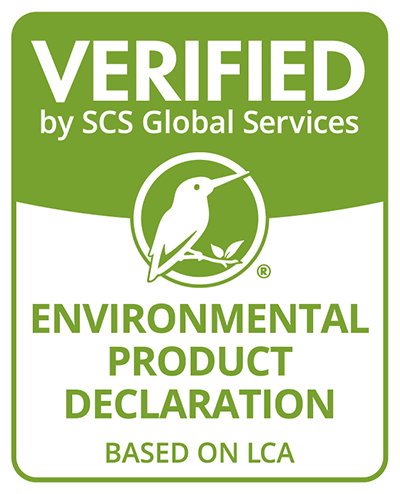Environmental Product Declaration Verification
Independent Assurance of Your LCA and EPD Data

- Home /
- Services /
- Green Building /
- Environmental Product Declaration Verification

Deliver Reliable ISO-Conformant Environmental Information
Environmental Product Declarations (EPDs) are an internationally recognized tool for translating the findings of a life-cycle assessment (LCA) into a detailed environmental disclosure about a product’s material make-up and impacts. To qualify for buyer specifications and green building ratings systems, your EPD must meet all the requirements of the applicable Product Category Rule (PCR), be fully conformant with international standards (ISO 14044, ISO 14025, and ISO 21930 or EN 15804), and be independently verified by a third-party.
SCS Expertise
SCS has been a leading third-party verifier of sustainability and environmental claims for many decades, and has championed standards development to help drive sustainability forward in a responsible manner. Our LCA and EPD service team is widely regarded for its professionalism, depth of experience, and customer service. Our lead verifier is recognized as both a LCA Certified Practitioner (LCACP) and Certified Life Cycle Assessment Reviewer (CLAR) under the American Center for LCA (ACLCA). In addition, SCS has a mutual recognition agreement with the International EPD System for building and construction products based on EN 15804 and ISO 21930, enabling clients to have EPDs recognized in the EU.
- Services
- Process
- FAQs
- Documents
If you have already had an LCA or EPD prepared, we can provide the independent verification you need to demonstrate that these documents meet international standards.
- LCA Critical Review. An SCS LCA expert will be assigned to conduct a third-party review of your LCA to confirm that it was completed in conformance with international standard ISO 14044. In addition, note that an LCA critical review is required if you are planning to publish an EPD. Find out more.
- EPD Verification. Once you have completed your EPD, the next step is to have it independently verified. SCS conducts this verification against your LCA report and the applicable PCR, to determine conformance to ISO 14025 (and if applicable, ISO 21930 and EN15804) requirements. Contact us to learn more.
- Product Category Rule (PCR) Development. If you have not yet prepared an EPD, and there is no applicable Product Category Rule (PCR) available for your industry’s category, we can facilitate the development of a PCR in conformance with international guidelines (ISO 14025). Ask us for details.
- Other LCA and EPD Services. To learn more about undertaking an LCA or preparing an EPD, or to obtain an EPD template, contact SCS Consulting.
- Submit your LCA and EPD to SCS for verification
- We check your LCA and EPD against the applicable standards and Product Category Rules, then provide feedback on non-conformities and opportunities for improvement
- You address the non-conformities and documented improvement in your LCA and EPD, then re-submit to SCS
- We confirm that non-conformities have been properly addressed
- We prepare a Verification Report confirming that your LCA and EPD meet the requirements of the applicable standards and PCRs
- We assign an EPD number and validity period to the EPD and publish the EPD to the SCS Green Products Guide
What is an EPD?
An EPD is an objective report based on life cycle assessment (LCA). It is used to communicate information about the potential environmental and human health impacts of a product. It states what a product is made of and how it impacts the environment across its entire life cycle, from raw material extraction through disposal. EPDs are developed in accordance with the requirements of ISO 14025 (and ISO 21930 for construction products).
What is the connection between Product Category Rules (PCR), LCAs, and EPDs?
EPDs are generated based on the findings of an LCA conducted in conformance with international standards. In addition, Product Category Rules (PCRs) provide more precise instructions about conducting LCAs for a particular product category. Each PCR describes the impact categories that must be quantified and reported, ensuring that all EPDs in the same product category report the same types of information. Examples of industries for which product-specific PCRs have been developed include:
- Steel Construction
- Concrete and Cement
- Wood Construction Products
- Roofing
- Insulation
- Office Furniture
- Paints
- Building Sealants
- Flooring
Many more PCRs are in the process of being developed for additional categories. Contact us today to see if a PCR is available for your product.
When should I have my EPD verified?
Once the LCA is completed, an EPD is prepared that summarizes the LCA. The LCA and EPD are then reviewed, and the EPD is verified by a third-party to ensure that it conforms with the relevant ISO standard and PCR requirements.
How are EPDs used?
EPDs qualify products for credit towards buildings under LEED v4.1, LEED v5, and other procurement systems. Having an EPD can help a manufacturer become a preferred supplier for designers and architects who specify for green building projects. Manufacturers also use the data from EPDs to identify areas of improvement within their manufacturing processes, helping them become more efficient and set realistic sustainability goals.
What LEED v4.1 credits do EPDs qualify for? What about LEED v5?
EPDs qualify for up to two points following the LEED v4.1 Materials and Resources credit:
MR: Building product disclosure and optimization - environmental product declarations. In LEED v5, EPDs contribute to the Material and Resources Credit Pre-Requisite to Quantify and Assess Embodied Carbon. Visit USGBC’s website for the full details.How do I get started?
The first step is to determine if there is a suitable PCR for your product category. Next, you’ll want to find a qualified LCA practitioner. Contact us for details.
| Document Name | Document |
|---|---|
| ISO 14044 | Visit Site |
| ISO 21930 | Visit Site |
| LCIA Methodology for PCR Modules for Roundwood and Pulp/Paper | English |
| PCR for Designated North American Steel Construction Products | English |
| PCR Module for Market Pulp and Paper Products | English |
| PCR Module for Roundwood Products | English |
| Procedure for Environmental Product Declaration (EPD) Verification | Visit Site |
| SCS Program Operator Manual | Visit Site |
Request Information
Ready to get started or need more info? Connect with us.
What Our Clients Are Saying
“Our management appreciates SCS’ EPD team for smooth coordination during the entire EPD and LCA process. We would especially like to thank Keith Killpack and Bobby Mathew for their immediate response and proper guidance to us during entire the project. It’s a very happy moment for us that we have eagerly awaited.”
Anand Bhojani, Bansiyi Overseas - Verified EPD of SPC Flooring for brand Andrea
“This is the second time we have worked with Keith and the team at SCS and it was extremely easy. They are knowledgeable and supportive, answering our many questions and queries, and patient with us as we took time to make sure we had the right information.”
Fiona Levin-Smith, IFS Coatings - Verified EPDs for powder coating products
“At the beginning of our step toward the verification process of EPD on our product, we were anxious about all terms, definitions and scope. However, SCS’ in-depth expertise and the utmost effort helped us feel comfortable and reached the end of tunnel. Thank you.”
Daniel Hong, Lotte Chemical California - Verified EPDs for Staron and Radianz
“The personnel at SCS Global Services were very helpful in giving us guidance and clarifying the information required from our company to create the EPD. They even took the time to set up videoconferences with us to clear up some questions we had. We would recommend SCS Global Services to any company that needs an EPD.”
Juan Delgado, Vinton Steel - Verified EPD for Fabricated Steel Rebar
Service Brochure










